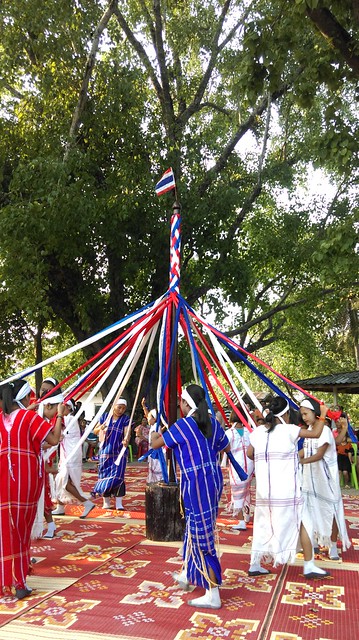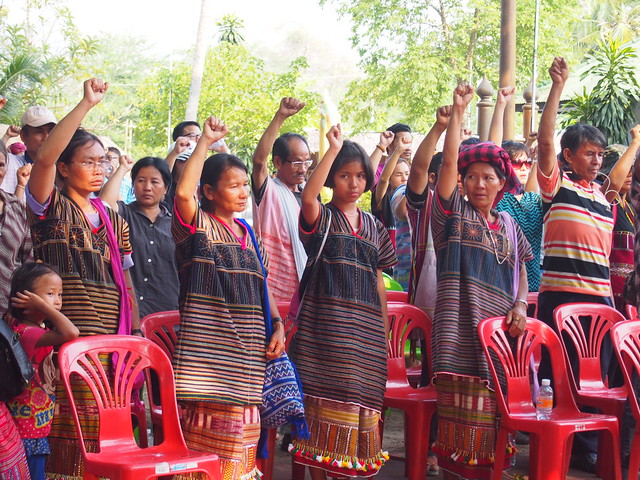The Karen tribes living in protected areas and national parks of western Thailand are worried about losing their livelihoods and being sidelined when the areas are declared a UNESCO natural world heritage site.
On Friday, a network of western Thailand’s Karen tribes and officers of Kaeng Krachan National Park in the western province of Ratchaburi held a seminar at Kaeng Krachan Park Cultural Centre to build understanding about the plan to nominate the complex of national parks and protected areas in the region as a UNESCO natural world heritage site.
The seminar, which featured Karen cultural activities, was also organised to commemorate the enforced disappearance of Porlajee ‘Billy’ Rakchongcharoen, a Karen human rights defender, who was disappeared on 17 April 2014.

Phinnapha Phrueksaphan, Billy’s wife, and her children at the 17 April 2015 seminar on plans to nominate the complex of national parks and protected areas in the western region as a UNESCO natural world heritage site.
The region is home to Mae Nam Pachi Wildlife Sanctuary and Chaloem Phrakiat Thai Prachan, Kaeng Krachan and Kui Buri National Parks, which together cover an area of over three million rai (about 4800 sq km) in three western provinces of Thailand.
In 2005, the Thai authorities submitted a proposal to UNESCO to consider the area as a future natural world heritage site.
At the seminar, Kamol Nuanyai, Kaeng Krachan National Park Chief, said that once the area is declared a UNESCO world heritage site, it will receive support, protection, and acknowledgement from the international community.

Traditional Karen robe dance performed at the seminar
Western Thailand’s Karen tribes, who have been settled in the area for generations, are however concerned that once the area is on the UNESCO heritage list, their livelihoods, which are connected to the forest and the region, might be affected.
The Karen added that they already have very limited rights to use forest resources and it might get worse if the proposal to the UNESCO is finalised.
Wuthi Boonlerd, a member of Thailand’s Western Karen Cultural and Environment Network, pointed out at the seminar that the park authorities should allow the Karen tribes to participate in park management and decision-making on the use of land and natural resources in the area.

Karens participate in the seminar which concerns their livelihoods
According to Surapong Kongchantuk, chairman of the Lawyers Council of Thailand's Human Rights Subcommittee on Ethnic Minorities, the Stateless, Migrant Workers and the Displaced, the proposal to make the area a UNESCO natural heritage site should take into account the cultural heritage of the Karen communities in the region as well.
He added that the proposal should be given thorough consideration which should take one more year.
The nomination to declare the area a UNESCO natural world heritage site is scheduled to be decided by the UNESCO committee during its meeting in Germany in June 2015.
Prachatai English is an independent, non-profit news outlet committed to covering underreported issues in Thailand, especially about democratization and human rights, despite pressure from the authorities. Your support will ensure that we stay a professional media source and be able to meet the challenges and deliver in-depth reporting.
• Simple steps to support Prachatai English
1. Bank transfer to account “โครงการหนังสือพิมพ์อินเทอร์เน็ต ประชาไท” or “Prachatai Online Newspaper” 091-0-21689-4, Krungthai Bank
2. Or, Transfer money via Paypal, to e-mail address: [email protected], please leave a comment on the transaction as “For Prachatai English”
